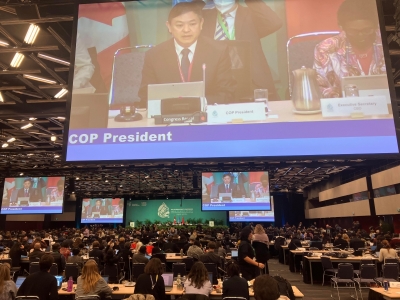
Montreal: Nearing the conclusion of a sometimes fractious two-week meeting, nearly 200 nations of the world on Monday agreed on a historic package of measures deemed critical to addressing the dangerous loss of biodiversity and restoring natural ecosystems.
Convened under UN auspices, chaired by China, and hosted by Canada, the 15th Conference of Parties to the UN Convention on Biological Diversity adopted the “Kunming-Montreal Global Biodiversity Framework” (GBF), including four goals and 23 targets for achievement by 2030.
Among the global targets for 2030 are: Effective conservation and management of at least 30 per cent of the world’s lands, inland waters, coastal areas and oceans, with emphasis on areas of particular importance for biodiversity and ecosystem functioning and services.
The GBF prioritizes ecologically-representative, well-connected and equitably-governed systems of protected areas and other effective area-based conservation, recognizing indigenous and traditional territories and practices.
Currently 17 per cent and 10 per cent of the world’s terrestrial and marine areas respectively are under protection.
Have restoration completed or underway on at least 30 per cent of degraded terrestrial, inland waters, and coastal and marine ecosystems and reduce to near zero the loss of areas of high biodiversity importance, including ecosystems of high ecological integrity.
The GBF warns: “Without such action, there will be a further acceleration in the global rate of species extinction, which is already at least tens to hundreds of times higher than it has averaged over the past 10 million years.”
The framework’s four overarching global goals:
Goal A
The integrity, connectivity and resilience of all ecosystems are maintained, enhanced, or restored, substantially increasing the area of natural ecosystems by 2050; Human induced extinction of known threatened species is halted, and, by 2050, extinction rate and risk of all species are reduced tenfold, and the abundance of native wild species is increased to healthy and resilient levels; The genetic diversity within populations of wild and domesticated species, is maintained, safeguarding their adaptive potential.
Goal B
Biodiversity is sustainably used and managed and nature’s contributions to people, including ecosystem functions and services, are valued, maintained and enhanced, with those currently in decline being restored, supporting the achievement of sustainable development, for the benefit of present and future generations by 2050
Goal C
The monetary and non-monetary benefits from the utilization of genetic resources, and digital sequence information on genetic resources, and of traditional knowledge associated with genetic resources, as applicable, are shared fairly and equitably, including, as appropriate with indigenous peoples and local communities, and substantially increased by 2050, while ensuring traditional knowledge associated with genetic resources is appropriately protected, thereby contributing to the conservation and sustainable use of biodiversity, in accordance with internationally agreed access and benefit-sharing instruments.
Goal D
Adequate means of implementation, including financial resources, capacity-building, technical and scientific cooperation, and access to and transfer of technology to fully implement the Kunmin-Montreal global biodiversity framework are secured and equitably accessible to all Parties, especially developing countries, in particular the least developed countries and small island developing States, as well as countries with economies in transition, progressively closing the biodiversity finance gap of $700 billion per year, and aligning financial flows with the Kunming-Montreal Global Biodiversity Framework and the 2050 Vision for Biodiversity.
Held at Montreal’s Palais des Congres from December 7-19, representatives of 188 governments on site (95 per cent of all 196 Parties to the UN CBD, as well as two non-Parties — the US and The Vatican), finalised and approved measures to arrest the ongoing loss of terrestrial and marine biodiversity and set humanity in the direction of a sustainable relationship with nature, with clear indicators to measure progress.
In addition to the GBF, the meeting approved a series of related agreements on its implementation, including planning, monitoring, reporting and review; resource mobilization; helping nations to build their capacity to meet the obligations; and digital sequence information on genetic resources.
Digital sequence information on genetic resources — a dominant topic at COP15 — has many commercial and non-commercial applications, including pharmaceutical product development, improved crop breeding, taxonomy, and the monitoring of invasive species.
COP15 delegates agreed to establish within the GBF a multilateral fund for the equitable sharing of benefits between providers and users of DSI, to be finalized at COP16 in Turkey in 2024.IANS



















